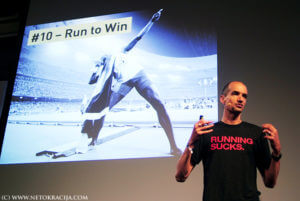Master Your Own Destiny: An Interview on Entrepreneurship with Pascal Finette

Share
In case you haven’t noticed, entrepreneurship is on the rise. In the US, 2015 had the most startup growth seen annually in over 20 years.
Some attribute this growth to the recovery of the US economy. Others claim it’s being fueled by sheer necessity. Take, for example, statistics on the increase in entrepreneurship among college students and young professionals.
One of the most exciting startup movements is the rise of social entrepreneurship—those founding companies to tackle big social challenges—like forming a company that uses mobile technology to give business loans to low-income individuals.
But building a successful startup goes far beyond identifying a cool business problem. It requires many soft skills, like grit, perseverance, and focus.
Singularity University entrepreneurship faculty chair and VP of SU Labs, Pascal Finette, knows a thing or two about what it takes to make it as an entrepreneur and startup founder.
His book The Heretic: Daily Therapeutics for Entrepreneurs, debuted on Amazon last week, so we sat down with Pascal to get some insights directly from the source.
What about entrepreneurship speaks to you most?
The sheer fact that you are the master of your own destiny—I believe this to be a fundamental piece of who we are and strive for as humans. There is nothing more liberating and, quite frankly, scary.
But once you’ve experienced the highs (and lows) of being an entrepreneur, you cannot not do it.
And to be clear, I use the term “entrepreneur” very liberally. For me, everyone who puts themselves out there, takes a risk and pushes the boundaries, is an entrepreneur. That can be a startup founder, but it can also be someone pushing for change inside of an organization or community.
Over the next five years, what technologies do you see leading the next batch of startups?
Personally, I am extremely bullish by the fast rise of the “Internet of Things.” Insanely cheap, small, energy-efficient computers and sensors will dramatically change the way we do pretty much everything as everything will become “smart.”
This is supported by an ever-increasing capability of cloud-based infrastructure, where more and more of the functionality you needed to develop on your own until recently is now available as a convenient API (Application Program Interface).
All the buzzword technologies, such as AI (artificial intelligence), AR (augmented reality), and VR (virtual reality), will become main drivers of innovation as they leap out of their niches into adjacent fields.
And lastly, I firmly believe that we will see some of the most fundamental changes to our lives coming from startups working in synthetic biology. With the ability to read and write the genome, we are bound to see some truly remarkable breakthroughs. With the cost of doing so dropping exponentially, we will see more and more startups in this area.
What factors might be contributing to the recent rise of entrepreneurship in the U.S.?
Particularly in technology-driven or enabled businesses, we have seen a dramatic drop in the costs of launching your business.
In the past, you needed to buy hardware/servers, house them in a datacenter, manage the servers as well as the application you wrote on them, and pay a licensing fee for the operating system and technology stack you used. Today, you use cloud-based infrastructure which you pay for by the hour. The infrastructure is managed by your cloud provider, and your software stack is largely free as it is open source.
Combine this with the exponential increase in price/performance for your hardware and software and the spread of better development practices, like agile and lean, and you have the perfect environment for launching companies cheaper and quicker than ever.
All this is further fueled by an abundance of free learning and reference resources, which enables more people to learn the necessary skills faster and cheaper than ever before.
Be Part of the Future
Sign up to receive top stories about groundbreaking technologies and visionary thinkers from SingularityHub.


All of this in turn, leads to more people becoming entrepreneurs as the barriers of entry are dropping rapidly.
You oversee SU Lab’s Startup Accelerator. What is a trend among the teams that you’ve picked up on?
Looking at our applications, there is always a “flavor of the moment” — specific topics or technologies which are hot.
Currently, it is clearly anything around the consumerization of medical devices, artificial intelligence, and sensor-enabled/driven systems.
From an entrepreneurs’ perspective, I believe it’s interesting to think about this and realize that if you’re late to a trend, you mostly missed the boat.
What’s an example of a startup using tech for positive social impact that inspires you most and is scalable and profitable?
Nexleaf Analytics is a wonderful example. Nexleaf invented a connected temperature sensor that is attached to a vaccine fridge and gives a nurse in the field information about the validity of the vaccine —the problem being that 20-30% of vaccines in developing countries spoil due to a break in the cold chain.
Nexleaf is used in a series of countries. They have, quite literally, made the problem go away and, in the process, are saving hundreds of thousands lives.
The beauty of the model is that the same sensor has strong commercial applications, for example, in cold chain monitoring for the food industry.
Today there’s a lot of hype around the glories and glamour of entrepreneurship, but what’s a big myth of entrepreneurship you can dispel?
Overnight success. There is pretty much no such thing, and if it happens, it is a black swan. As mentioned earlier—it takes time, effort, gumcha, dedication, and perseverance to build something.
If you’re working on something BIG and applying breakthrough technologies to improve millions of lives around the world, the SU Labs Startup Accelerator might be right for you! Our third cohort starts in February 2017, and we’ll start accepting applications in September.
We are a participant in the Amazon Services LLC Associates Program, an affiliate advertising program designed to provide a means for us to earn fees by linking to Amazon.com and affiliated sites.
Alison tells the stories of purpose-driven leaders and is fascinated by various intersections of technology and society. When not keeping a finger on the pulse of all things Singularity University, you'll likely find Alison in the woods sipping coffee and reading philosophy (new book recommendations are welcome).
Related Articles

This Week’s Awesome Tech Stories From Around the Web (Through December 13)

New Immune Treatment May Suppress HIV—No Daily Pills Required

How Scientists Are Growing Computers From Human Brain Cells—and Why They Want to Keep Doing It
What we’re reading

